Globalization and Management: Theories, Issues, and Solutions
VerifiedAdded on 2021/06/14
|8
|1928
|68
Essay
AI Summary
This essay delves into the multifaceted impact of globalization on management, examining its effects on business, society, and the environment. It highlights the positive aspects of globalization, such as increased competition and technological advancements, while also addressing its negative consequences, including unethical practices and economic interdependence. The essay categorizes globalization theories, focusing on constructivism as a solution to management issues like employee motivation. It further explores cross-cultural management, emphasizing the importance of understanding cultural dimensions like individualism and power distance. The conclusion underscores the overall impact of globalization as a boon for humankind despite some negative aspects.
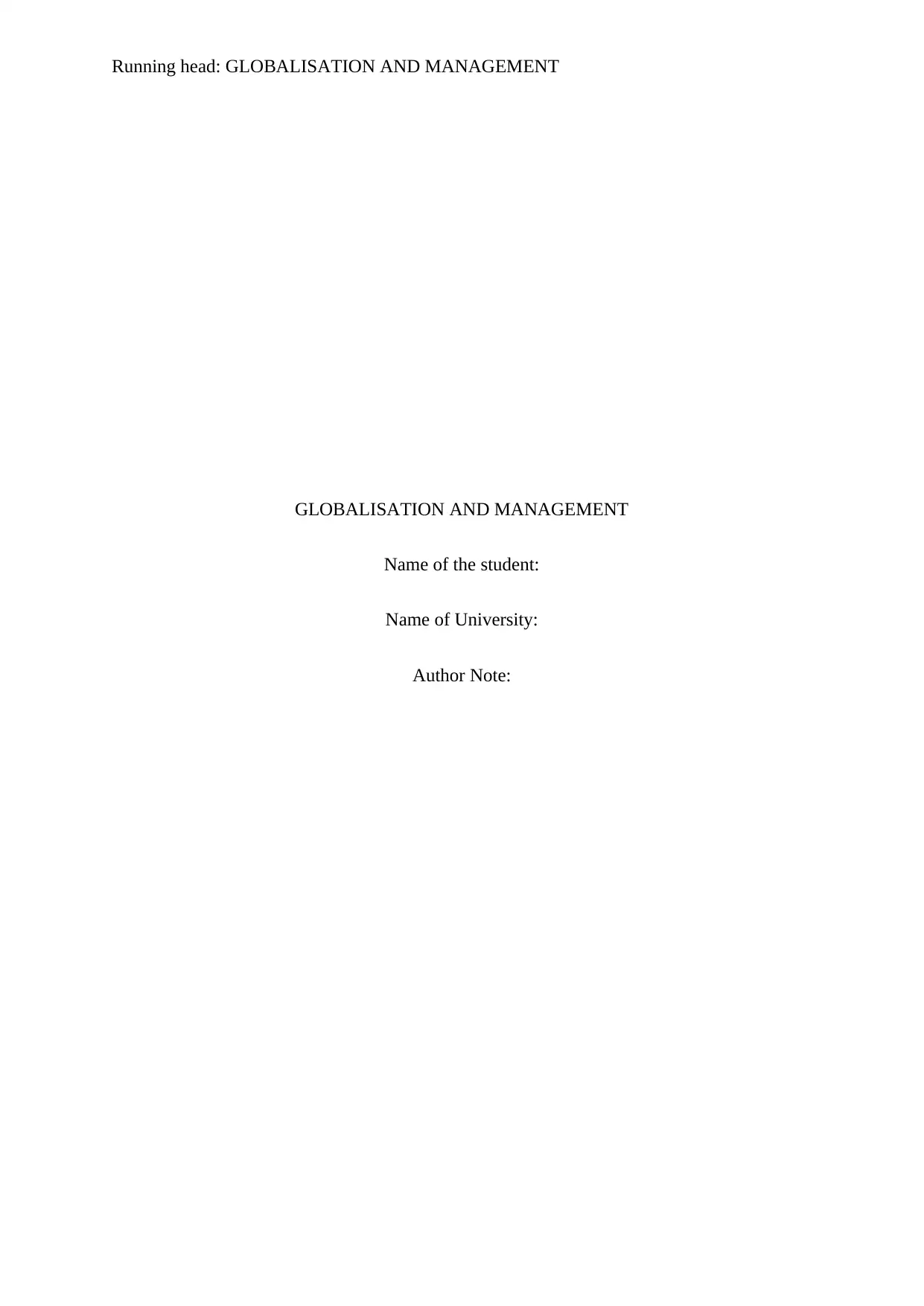
Running head: GLOBALISATION AND MANAGEMENT
GLOBALISATION AND MANAGEMENT
Name of the student:
Name of University:
Author Note:
GLOBALISATION AND MANAGEMENT
Name of the student:
Name of University:
Author Note:
Paraphrase This Document
Need a fresh take? Get an instant paraphrase of this document with our AI Paraphraser
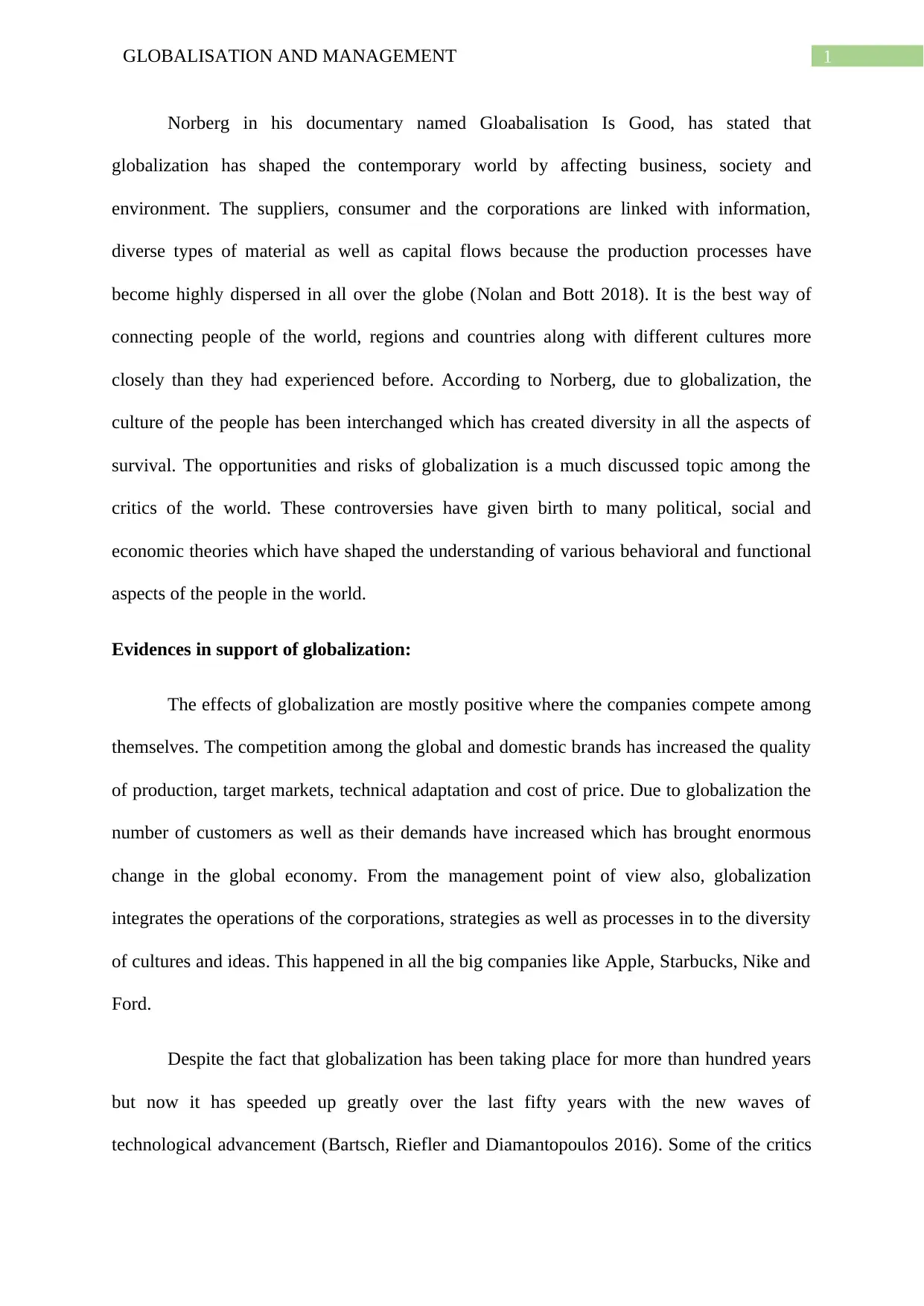
1GLOBALISATION AND MANAGEMENT
Norberg in his documentary named Gloabalisation Is Good, has stated that
globalization has shaped the contemporary world by affecting business, society and
environment. The suppliers, consumer and the corporations are linked with information,
diverse types of material as well as capital flows because the production processes have
become highly dispersed in all over the globe (Nolan and Bott 2018). It is the best way of
connecting people of the world, regions and countries along with different cultures more
closely than they had experienced before. According to Norberg, due to globalization, the
culture of the people has been interchanged which has created diversity in all the aspects of
survival. The opportunities and risks of globalization is a much discussed topic among the
critics of the world. These controversies have given birth to many political, social and
economic theories which have shaped the understanding of various behavioral and functional
aspects of the people in the world.
Evidences in support of globalization:
The effects of globalization are mostly positive where the companies compete among
themselves. The competition among the global and domestic brands has increased the quality
of production, target markets, technical adaptation and cost of price. Due to globalization the
number of customers as well as their demands have increased which has brought enormous
change in the global economy. From the management point of view also, globalization
integrates the operations of the corporations, strategies as well as processes in to the diversity
of cultures and ideas. This happened in all the big companies like Apple, Starbucks, Nike and
Ford.
Despite the fact that globalization has been taking place for more than hundred years
but now it has speeded up greatly over the last fifty years with the new waves of
technological advancement (Bartsch, Riefler and Diamantopoulos 2016). Some of the critics
Norberg in his documentary named Gloabalisation Is Good, has stated that
globalization has shaped the contemporary world by affecting business, society and
environment. The suppliers, consumer and the corporations are linked with information,
diverse types of material as well as capital flows because the production processes have
become highly dispersed in all over the globe (Nolan and Bott 2018). It is the best way of
connecting people of the world, regions and countries along with different cultures more
closely than they had experienced before. According to Norberg, due to globalization, the
culture of the people has been interchanged which has created diversity in all the aspects of
survival. The opportunities and risks of globalization is a much discussed topic among the
critics of the world. These controversies have given birth to many political, social and
economic theories which have shaped the understanding of various behavioral and functional
aspects of the people in the world.
Evidences in support of globalization:
The effects of globalization are mostly positive where the companies compete among
themselves. The competition among the global and domestic brands has increased the quality
of production, target markets, technical adaptation and cost of price. Due to globalization the
number of customers as well as their demands have increased which has brought enormous
change in the global economy. From the management point of view also, globalization
integrates the operations of the corporations, strategies as well as processes in to the diversity
of cultures and ideas. This happened in all the big companies like Apple, Starbucks, Nike and
Ford.
Despite the fact that globalization has been taking place for more than hundred years
but now it has speeded up greatly over the last fifty years with the new waves of
technological advancement (Bartsch, Riefler and Diamantopoulos 2016). Some of the critics
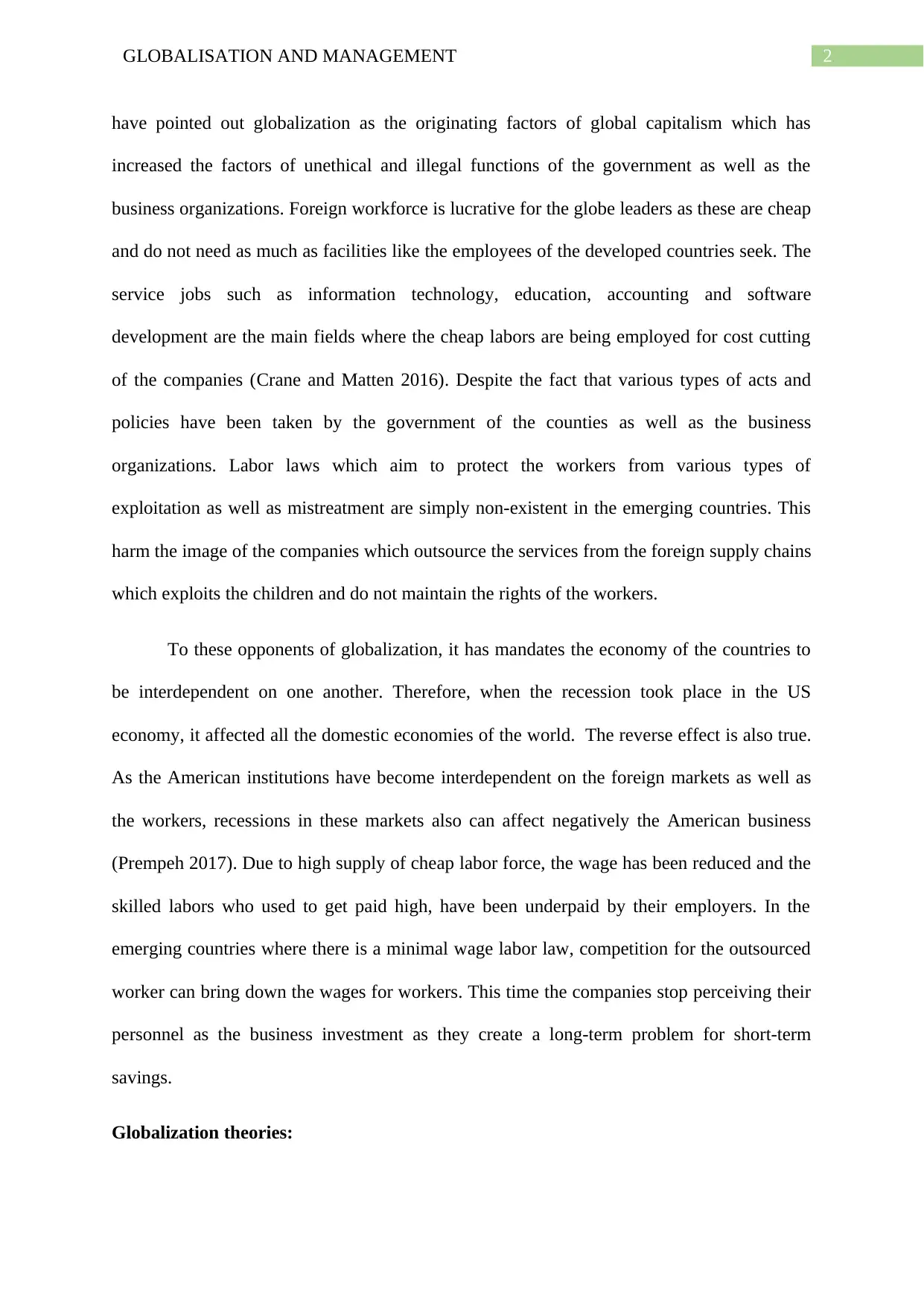
2GLOBALISATION AND MANAGEMENT
have pointed out globalization as the originating factors of global capitalism which has
increased the factors of unethical and illegal functions of the government as well as the
business organizations. Foreign workforce is lucrative for the globe leaders as these are cheap
and do not need as much as facilities like the employees of the developed countries seek. The
service jobs such as information technology, education, accounting and software
development are the main fields where the cheap labors are being employed for cost cutting
of the companies (Crane and Matten 2016). Despite the fact that various types of acts and
policies have been taken by the government of the counties as well as the business
organizations. Labor laws which aim to protect the workers from various types of
exploitation as well as mistreatment are simply non-existent in the emerging countries. This
harm the image of the companies which outsource the services from the foreign supply chains
which exploits the children and do not maintain the rights of the workers.
To these opponents of globalization, it has mandates the economy of the countries to
be interdependent on one another. Therefore, when the recession took place in the US
economy, it affected all the domestic economies of the world. The reverse effect is also true.
As the American institutions have become interdependent on the foreign markets as well as
the workers, recessions in these markets also can affect negatively the American business
(Prempeh 2017). Due to high supply of cheap labor force, the wage has been reduced and the
skilled labors who used to get paid high, have been underpaid by their employers. In the
emerging countries where there is a minimal wage labor law, competition for the outsourced
worker can bring down the wages for workers. This time the companies stop perceiving their
personnel as the business investment as they create a long-term problem for short-term
savings.
Globalization theories:
have pointed out globalization as the originating factors of global capitalism which has
increased the factors of unethical and illegal functions of the government as well as the
business organizations. Foreign workforce is lucrative for the globe leaders as these are cheap
and do not need as much as facilities like the employees of the developed countries seek. The
service jobs such as information technology, education, accounting and software
development are the main fields where the cheap labors are being employed for cost cutting
of the companies (Crane and Matten 2016). Despite the fact that various types of acts and
policies have been taken by the government of the counties as well as the business
organizations. Labor laws which aim to protect the workers from various types of
exploitation as well as mistreatment are simply non-existent in the emerging countries. This
harm the image of the companies which outsource the services from the foreign supply chains
which exploits the children and do not maintain the rights of the workers.
To these opponents of globalization, it has mandates the economy of the countries to
be interdependent on one another. Therefore, when the recession took place in the US
economy, it affected all the domestic economies of the world. The reverse effect is also true.
As the American institutions have become interdependent on the foreign markets as well as
the workers, recessions in these markets also can affect negatively the American business
(Prempeh 2017). Due to high supply of cheap labor force, the wage has been reduced and the
skilled labors who used to get paid high, have been underpaid by their employers. In the
emerging countries where there is a minimal wage labor law, competition for the outsourced
worker can bring down the wages for workers. This time the companies stop perceiving their
personnel as the business investment as they create a long-term problem for short-term
savings.
Globalization theories:
⊘ This is a preview!⊘
Do you want full access?
Subscribe today to unlock all pages.

Trusted by 1+ million students worldwide
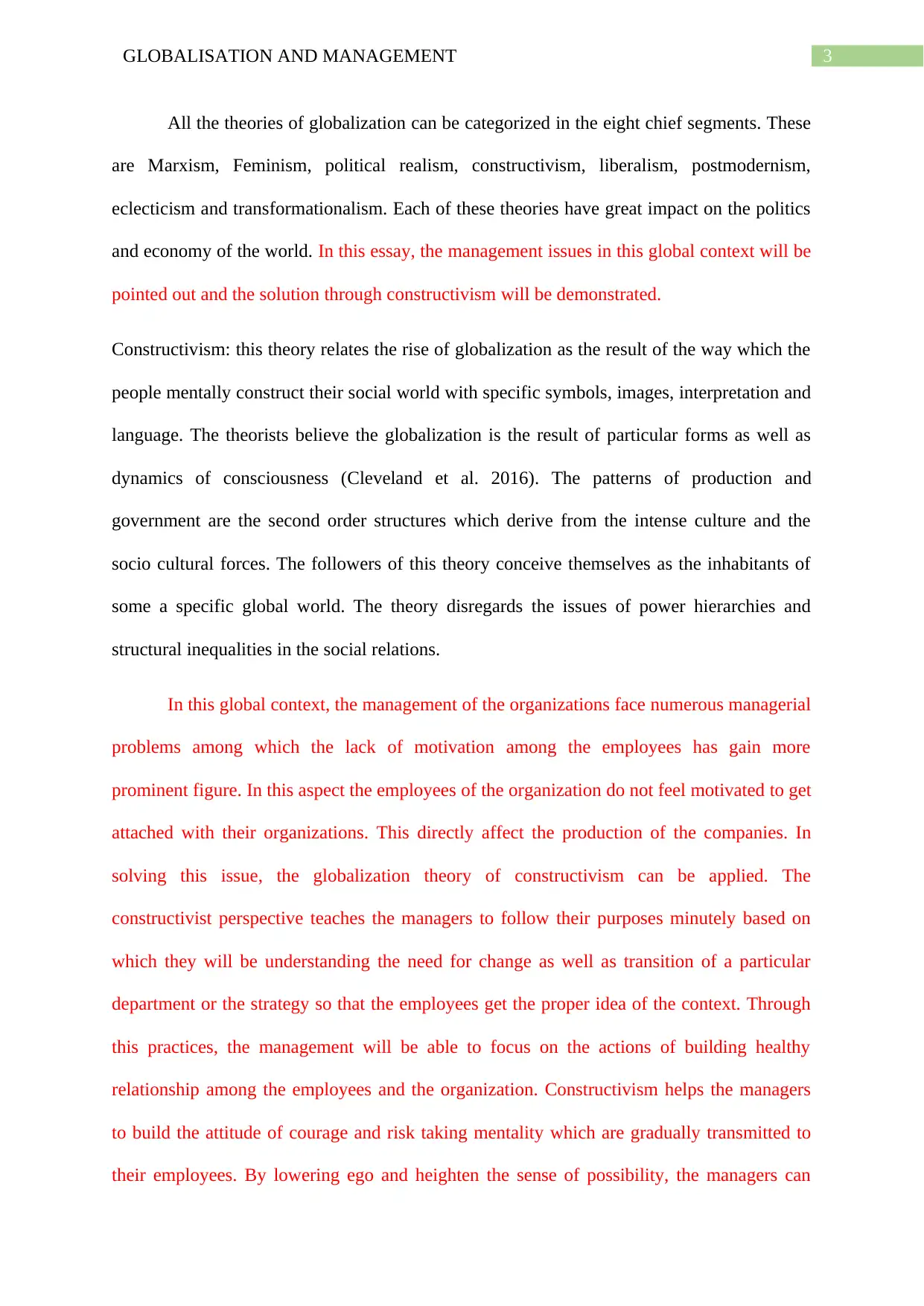
3GLOBALISATION AND MANAGEMENT
All the theories of globalization can be categorized in the eight chief segments. These
are Marxism, Feminism, political realism, constructivism, liberalism, postmodernism,
eclecticism and transformationalism. Each of these theories have great impact on the politics
and economy of the world. In this essay, the management issues in this global context will be
pointed out and the solution through constructivism will be demonstrated.
Constructivism: this theory relates the rise of globalization as the result of the way which the
people mentally construct their social world with specific symbols, images, interpretation and
language. The theorists believe the globalization is the result of particular forms as well as
dynamics of consciousness (Cleveland et al. 2016). The patterns of production and
government are the second order structures which derive from the intense culture and the
socio cultural forces. The followers of this theory conceive themselves as the inhabitants of
some a specific global world. The theory disregards the issues of power hierarchies and
structural inequalities in the social relations.
In this global context, the management of the organizations face numerous managerial
problems among which the lack of motivation among the employees has gain more
prominent figure. In this aspect the employees of the organization do not feel motivated to get
attached with their organizations. This directly affect the production of the companies. In
solving this issue, the globalization theory of constructivism can be applied. The
constructivist perspective teaches the managers to follow their purposes minutely based on
which they will be understanding the need for change as well as transition of a particular
department or the strategy so that the employees get the proper idea of the context. Through
this practices, the management will be able to focus on the actions of building healthy
relationship among the employees and the organization. Constructivism helps the managers
to build the attitude of courage and risk taking mentality which are gradually transmitted to
their employees. By lowering ego and heighten the sense of possibility, the managers can
All the theories of globalization can be categorized in the eight chief segments. These
are Marxism, Feminism, political realism, constructivism, liberalism, postmodernism,
eclecticism and transformationalism. Each of these theories have great impact on the politics
and economy of the world. In this essay, the management issues in this global context will be
pointed out and the solution through constructivism will be demonstrated.
Constructivism: this theory relates the rise of globalization as the result of the way which the
people mentally construct their social world with specific symbols, images, interpretation and
language. The theorists believe the globalization is the result of particular forms as well as
dynamics of consciousness (Cleveland et al. 2016). The patterns of production and
government are the second order structures which derive from the intense culture and the
socio cultural forces. The followers of this theory conceive themselves as the inhabitants of
some a specific global world. The theory disregards the issues of power hierarchies and
structural inequalities in the social relations.
In this global context, the management of the organizations face numerous managerial
problems among which the lack of motivation among the employees has gain more
prominent figure. In this aspect the employees of the organization do not feel motivated to get
attached with their organizations. This directly affect the production of the companies. In
solving this issue, the globalization theory of constructivism can be applied. The
constructivist perspective teaches the managers to follow their purposes minutely based on
which they will be understanding the need for change as well as transition of a particular
department or the strategy so that the employees get the proper idea of the context. Through
this practices, the management will be able to focus on the actions of building healthy
relationship among the employees and the organization. Constructivism helps the managers
to build the attitude of courage and risk taking mentality which are gradually transmitted to
their employees. By lowering ego and heighten the sense of possibility, the managers can
Paraphrase This Document
Need a fresh take? Get an instant paraphrase of this document with our AI Paraphraser
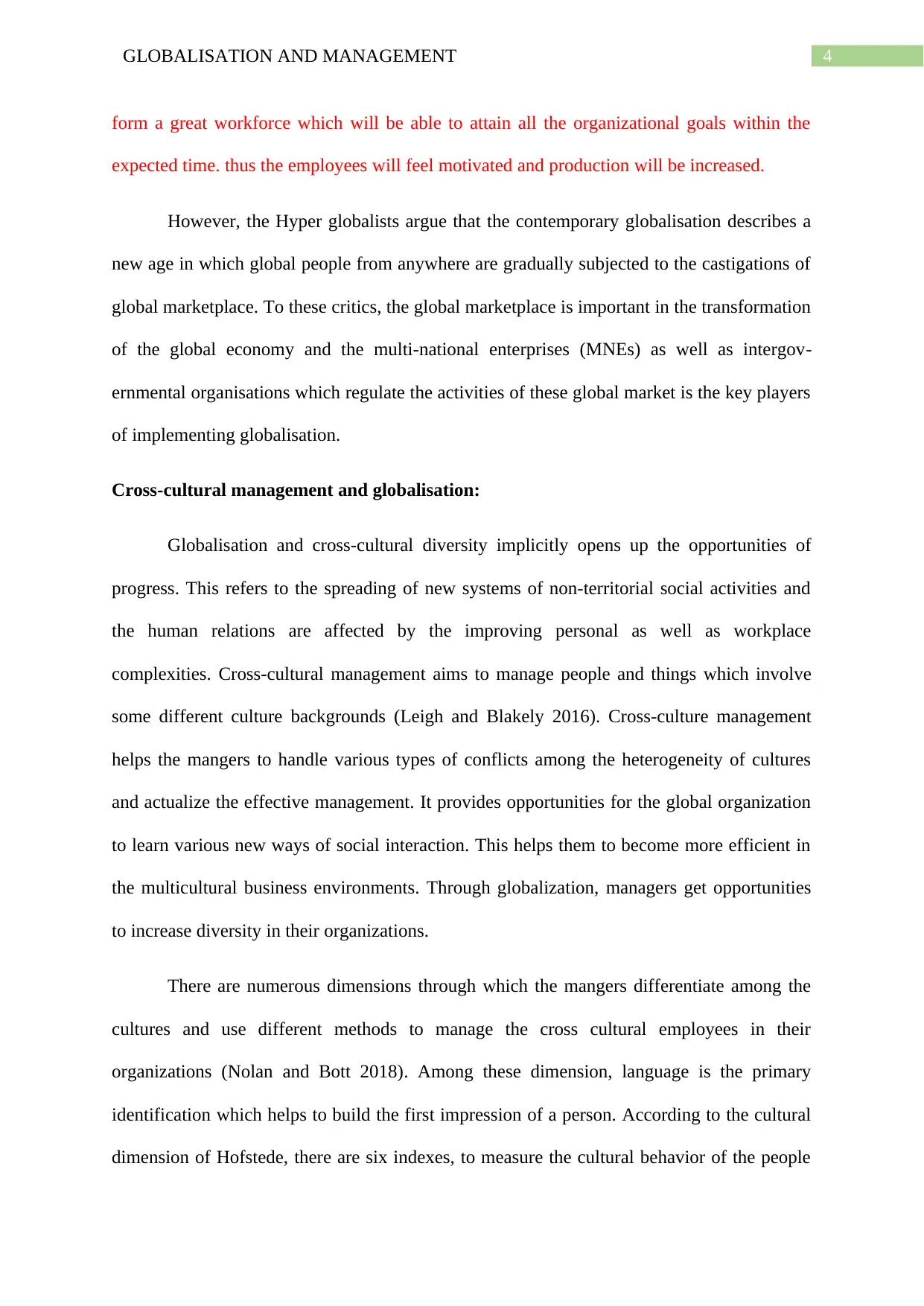
4GLOBALISATION AND MANAGEMENT
form a great workforce which will be able to attain all the organizational goals within the
expected time. thus the employees will feel motivated and production will be increased.
However, the Hyper globalists argue that the contemporary globalisation describes a
new age in which global people from anywhere are gradually subjected to the castigations of
global marketplace. To these critics, the global marketplace is important in the transformation
of the global economy and the multi-national enterprises (MNEs) as well as intergov-
ernmental organisations which regulate the activities of these global market is the key players
of implementing globalisation.
Cross-cultural management and globalisation:
Globalisation and cross-cultural diversity implicitly opens up the opportunities of
progress. This refers to the spreading of new systems of non-territorial social activities and
the human relations are affected by the improving personal as well as workplace
complexities. Cross-cultural management aims to manage people and things which involve
some different culture backgrounds (Leigh and Blakely 2016). Cross-culture management
helps the mangers to handle various types of conflicts among the heterogeneity of cultures
and actualize the effective management. It provides opportunities for the global organization
to learn various new ways of social interaction. This helps them to become more efficient in
the multicultural business environments. Through globalization, managers get opportunities
to increase diversity in their organizations.
There are numerous dimensions through which the mangers differentiate among the
cultures and use different methods to manage the cross cultural employees in their
organizations (Nolan and Bott 2018). Among these dimension, language is the primary
identification which helps to build the first impression of a person. According to the cultural
dimension of Hofstede, there are six indexes, to measure the cultural behavior of the people
form a great workforce which will be able to attain all the organizational goals within the
expected time. thus the employees will feel motivated and production will be increased.
However, the Hyper globalists argue that the contemporary globalisation describes a
new age in which global people from anywhere are gradually subjected to the castigations of
global marketplace. To these critics, the global marketplace is important in the transformation
of the global economy and the multi-national enterprises (MNEs) as well as intergov-
ernmental organisations which regulate the activities of these global market is the key players
of implementing globalisation.
Cross-cultural management and globalisation:
Globalisation and cross-cultural diversity implicitly opens up the opportunities of
progress. This refers to the spreading of new systems of non-territorial social activities and
the human relations are affected by the improving personal as well as workplace
complexities. Cross-cultural management aims to manage people and things which involve
some different culture backgrounds (Leigh and Blakely 2016). Cross-culture management
helps the mangers to handle various types of conflicts among the heterogeneity of cultures
and actualize the effective management. It provides opportunities for the global organization
to learn various new ways of social interaction. This helps them to become more efficient in
the multicultural business environments. Through globalization, managers get opportunities
to increase diversity in their organizations.
There are numerous dimensions through which the mangers differentiate among the
cultures and use different methods to manage the cross cultural employees in their
organizations (Nolan and Bott 2018). Among these dimension, language is the primary
identification which helps to build the first impression of a person. According to the cultural
dimension of Hofstede, there are six indexes, to measure the cultural behavior of the people
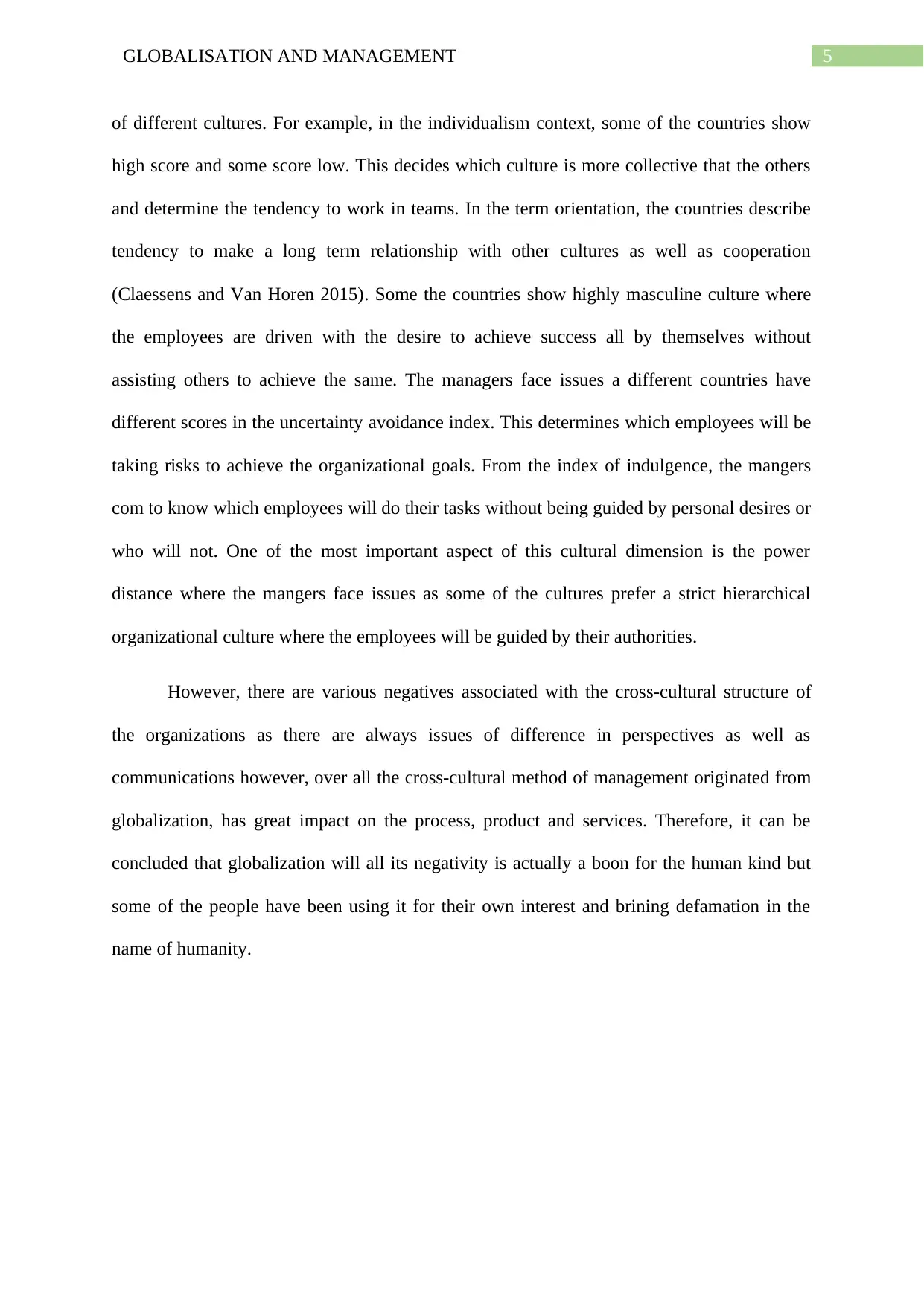
5GLOBALISATION AND MANAGEMENT
of different cultures. For example, in the individualism context, some of the countries show
high score and some score low. This decides which culture is more collective that the others
and determine the tendency to work in teams. In the term orientation, the countries describe
tendency to make a long term relationship with other cultures as well as cooperation
(Claessens and Van Horen 2015). Some the countries show highly masculine culture where
the employees are driven with the desire to achieve success all by themselves without
assisting others to achieve the same. The managers face issues a different countries have
different scores in the uncertainty avoidance index. This determines which employees will be
taking risks to achieve the organizational goals. From the index of indulgence, the mangers
com to know which employees will do their tasks without being guided by personal desires or
who will not. One of the most important aspect of this cultural dimension is the power
distance where the mangers face issues as some of the cultures prefer a strict hierarchical
organizational culture where the employees will be guided by their authorities.
However, there are various negatives associated with the cross-cultural structure of
the organizations as there are always issues of difference in perspectives as well as
communications however, over all the cross-cultural method of management originated from
globalization, has great impact on the process, product and services. Therefore, it can be
concluded that globalization will all its negativity is actually a boon for the human kind but
some of the people have been using it for their own interest and brining defamation in the
name of humanity.
of different cultures. For example, in the individualism context, some of the countries show
high score and some score low. This decides which culture is more collective that the others
and determine the tendency to work in teams. In the term orientation, the countries describe
tendency to make a long term relationship with other cultures as well as cooperation
(Claessens and Van Horen 2015). Some the countries show highly masculine culture where
the employees are driven with the desire to achieve success all by themselves without
assisting others to achieve the same. The managers face issues a different countries have
different scores in the uncertainty avoidance index. This determines which employees will be
taking risks to achieve the organizational goals. From the index of indulgence, the mangers
com to know which employees will do their tasks without being guided by personal desires or
who will not. One of the most important aspect of this cultural dimension is the power
distance where the mangers face issues as some of the cultures prefer a strict hierarchical
organizational culture where the employees will be guided by their authorities.
However, there are various negatives associated with the cross-cultural structure of
the organizations as there are always issues of difference in perspectives as well as
communications however, over all the cross-cultural method of management originated from
globalization, has great impact on the process, product and services. Therefore, it can be
concluded that globalization will all its negativity is actually a boon for the human kind but
some of the people have been using it for their own interest and brining defamation in the
name of humanity.
⊘ This is a preview!⊘
Do you want full access?
Subscribe today to unlock all pages.

Trusted by 1+ million students worldwide
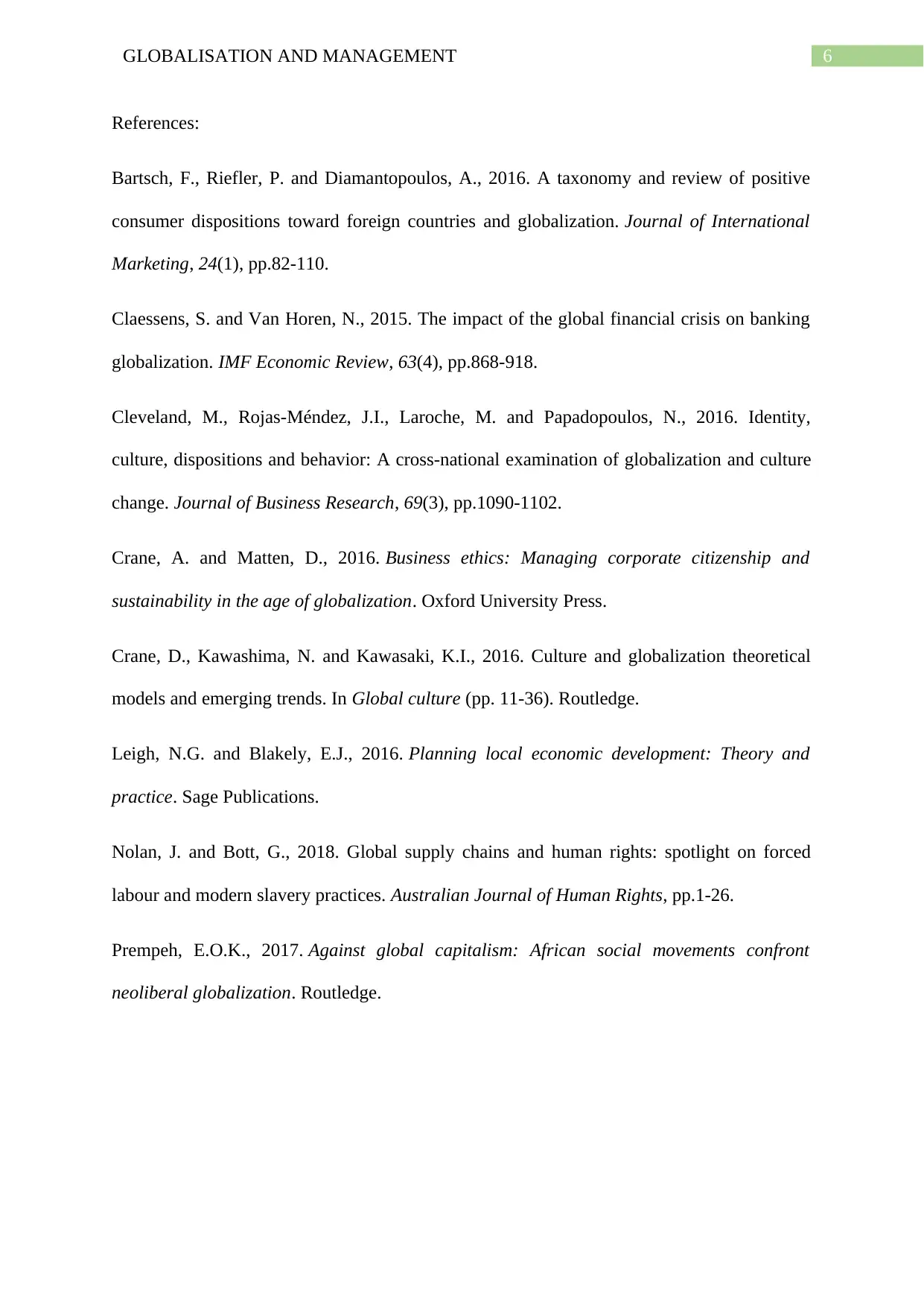
6GLOBALISATION AND MANAGEMENT
References:
Bartsch, F., Riefler, P. and Diamantopoulos, A., 2016. A taxonomy and review of positive
consumer dispositions toward foreign countries and globalization. Journal of International
Marketing, 24(1), pp.82-110.
Claessens, S. and Van Horen, N., 2015. The impact of the global financial crisis on banking
globalization. IMF Economic Review, 63(4), pp.868-918.
Cleveland, M., Rojas-Méndez, J.I., Laroche, M. and Papadopoulos, N., 2016. Identity,
culture, dispositions and behavior: A cross-national examination of globalization and culture
change. Journal of Business Research, 69(3), pp.1090-1102.
Crane, A. and Matten, D., 2016. Business ethics: Managing corporate citizenship and
sustainability in the age of globalization. Oxford University Press.
Crane, D., Kawashima, N. and Kawasaki, K.I., 2016. Culture and globalization theoretical
models and emerging trends. In Global culture (pp. 11-36). Routledge.
Leigh, N.G. and Blakely, E.J., 2016. Planning local economic development: Theory and
practice. Sage Publications.
Nolan, J. and Bott, G., 2018. Global supply chains and human rights: spotlight on forced
labour and modern slavery practices. Australian Journal of Human Rights, pp.1-26.
Prempeh, E.O.K., 2017. Against global capitalism: African social movements confront
neoliberal globalization. Routledge.
References:
Bartsch, F., Riefler, P. and Diamantopoulos, A., 2016. A taxonomy and review of positive
consumer dispositions toward foreign countries and globalization. Journal of International
Marketing, 24(1), pp.82-110.
Claessens, S. and Van Horen, N., 2015. The impact of the global financial crisis on banking
globalization. IMF Economic Review, 63(4), pp.868-918.
Cleveland, M., Rojas-Méndez, J.I., Laroche, M. and Papadopoulos, N., 2016. Identity,
culture, dispositions and behavior: A cross-national examination of globalization and culture
change. Journal of Business Research, 69(3), pp.1090-1102.
Crane, A. and Matten, D., 2016. Business ethics: Managing corporate citizenship and
sustainability in the age of globalization. Oxford University Press.
Crane, D., Kawashima, N. and Kawasaki, K.I., 2016. Culture and globalization theoretical
models and emerging trends. In Global culture (pp. 11-36). Routledge.
Leigh, N.G. and Blakely, E.J., 2016. Planning local economic development: Theory and
practice. Sage Publications.
Nolan, J. and Bott, G., 2018. Global supply chains and human rights: spotlight on forced
labour and modern slavery practices. Australian Journal of Human Rights, pp.1-26.
Prempeh, E.O.K., 2017. Against global capitalism: African social movements confront
neoliberal globalization. Routledge.
Paraphrase This Document
Need a fresh take? Get an instant paraphrase of this document with our AI Paraphraser

7GLOBALISATION AND MANAGEMENT
1 out of 8
Related Documents
Your All-in-One AI-Powered Toolkit for Academic Success.
+13062052269
info@desklib.com
Available 24*7 on WhatsApp / Email
![[object Object]](/_next/static/media/star-bottom.7253800d.svg)
Unlock your academic potential
Copyright © 2020–2026 A2Z Services. All Rights Reserved. Developed and managed by ZUCOL.





